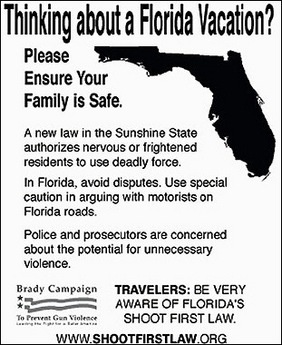Fresh scrutiny of Stand Your Ground laws after acquittal in Trayvon Martin killing

In the wake of last year's shooting of unarmed teen Trayvon Martin in Sanford, Fla. by self-appointed neighborhood watchman George Zimmerman, attention turned to the American Legislative Exchange Council (ALEC), which promoted the controversial Stand Your Ground law that was cited in Zimmerman's defense. ALEC brings together state lawmakers and corporations to craft model legislation benefiting business interests.
Since Zimmerman was acquitted of second-degree murder charges on Saturday, ALEC is once again getting attention for its role in the passage of Stand Your Ground laws. Today at least 21 states* have laws on the books saying there is no duty to retreat from an attacker in any place where one is lawfully present. And at least nine of those states** include specific "stand your ground" language, according to the National Conference of State Legislatures. Such laws are especially popular in the South, which is home to 11 of the 21 "no duty to retreat" laws and six of the nine laws that specifically use "stand your ground" wording.
The instructions to the jury in Zimmerman's trial referenced the state's Stand Your Ground law (emphasis added):
If George Zimmerman was not engaged in an unlawful activity and was attacked in any place where he had a right to be, he had no duty to retreat and had the right to stand his ground and meet force with force, including deadly force if he reasonably believed that it was necessary to do so to prevent death or great bodily harm to himself or another or to prevent the commission of a forcible felony.
In a statement released after Zimmerman's acquittal, NAACP President and CEO Benjamin Todd Jealous called on the U.S. Department of Justice to file civil rights charges against Zimmerman -- and also called for repealing Stand Your Ground laws:
We are outraged and heartbroken over today’s verdict. We stand with Trayvon's family and we are called to act. We will pursue civil rights charges with the Department of Justice, we will continue to fight for the removal of Stand Your Ground laws in every state, and we will not rest until racial profiling in all its forms is outlawed.
New York City Mayor Michael Bloomberg, a prominent national advocate of gun safety, added his voice to the call for repeal of Stand Your Ground laws:
But one fact has long been crystal clear: "shoot-first" laws like those in Florida can inspire dangerous vigilantism and protect those who act recklessly with guns. Such laws -- drafted by gun lobby extremists in Washington -- encourage deadly confrontations by enabling people to shoot first and argue "justifiable homicide" later.
Speaking Sunday with MSNBC's Up with Steve Kornacki, National Urban League President Marc Morial renewed the call for corporate sponsors to withdraw from ALEC in response to the Stand Your Ground controversy:
It's important to recognize a year ago when there was some sunlight on ALEC, many of us called for many of its major supporters to withdraw. I want to renew that call this morning, because the poison of the stand your ground law was from ALEC. …There needs to be sunlight on what they're doing, which what they're doing is creating model legislation and spread the poison of stand your ground all over the nation. Those who support ALEC should withdraw from ALEC because this kind of thing and the use of stand your ground is why at the very instance the law enforcement there in Sanford, Florida, did not arrest George Zimmerman as they should have, at the very inception.
Civil rights advocacy groups including the NAACP, Urban League, Color of Change, Common Cause, People for the American Way, and MoveOn.org were among the groups that put pressure on ALEC members to withdraw from the group over the law.
In response to that campaign, at least 49 corporations and six nonprofits have publicly announced they were leaving ALEC. Among them are a number of corporations with headquarters in the South, including Coca-Cola, Wal-Mart, Bank of America, and ConocoPhillips. But scores of other corporations continue their association with the group, including South-based Duke Energy, ExxonMobil, Georgia-Pacific, International Paper, Marathon Oil and Norfolk Southern Railway.
Intensifying the controversy over such laws is the racial bias in their application. An analysis of FBI crime data released last year by the Urban Institute found that in homicides resembling the Martin case, where there was a single shooting victim and a single shooter who were both civilians and strangers, just 10.9 percent were ruled to be justifiable homicides. But in Stand Your Ground states, 13.6 percent were found to be justified, compared to only 7.2 percent in non-Stand Your Ground states.
The analysis also found that the scenario with the highest probability of being ruled a justifiable homicide involves a white civilian shooter who is older than and a stranger to a black victim. Zimmerman's father is white and his mother is a multiracial Latina from Peru, while Martin was African-American.
As Lisa Wade observed at the Sociological Images blog:
It's simple: We are already biased in favor of the white defendant and against the black victim. Stand your ground laws give jurors more leeway to give defendants the benefit of the doubt. This increase[s] even further the chances that a white-on-black homicide will be considered justifiable because jurors will likely give that benefit of the doubt to certain kinds of defendants and not others. Stand your ground may or may not be a good law in theory but, in practice, it increases racial bias in legal outcomes.
* Alabama, Arizona, Florida, Georgia, Indiana, Kansas, Kentucky, Louisiana, Michigan, Mississippi, Montana, Nevada, New Hampshire, North Carolina, Oklahoma, Pennsylvania, South Carolina, Tennessee, Texas, Utah and West Virginia.
** Alabama, Florida, Georgia, Kansas, Kentucky, Louisiana, Oklahoma, Pennsylvania and South Carolina.
Tags
Sue Sturgis
Sue is the former editorial director of Facing South and the Institute for Southern Studies.
